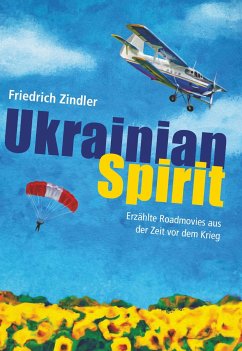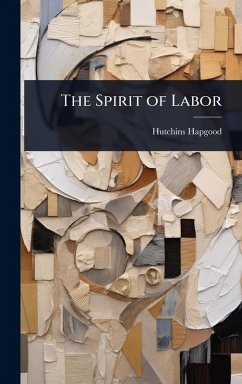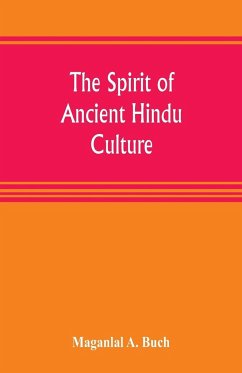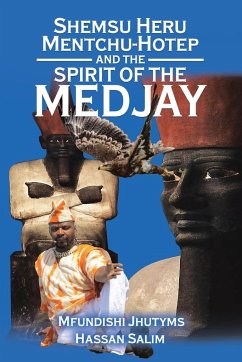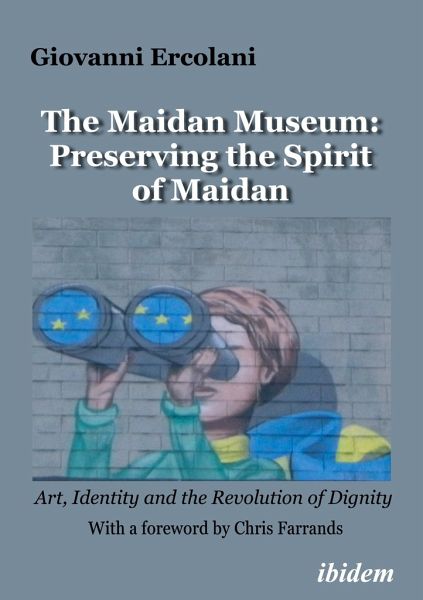
The Maidan Museum: Preserving the Spirit of Maidan

PAYBACK Punkte
0 °P sammeln!
The book examines the relation between art created during the so-called Revolution of Dignity-Maidan Events (November 21, 2013 - February 23, 2014, Ukraine) and the mission of the Maidan Museum (Kyiv, Ukraine) born from the ashes of Euromaidan, to preserve the 'Spirit of Maidan'. The Maidan events, defined as the Maidanization process, produced a post-colonial discourse language, a new apolitical ideology based on the concepts of dignity and Ukrainianness; generated symbols, social myths, and collective imaginary; triggered the 'Spirit of Maidan' that changed the consciousness of the participa...
The book examines the relation between art created during the so-called Revolution of Dignity-Maidan Events (November 21, 2013 - February 23, 2014, Ukraine) and the mission of the Maidan Museum (Kyiv, Ukraine) born from the ashes of Euromaidan, to preserve the 'Spirit of Maidan'. The Maidan events, defined as the Maidanization process, produced a post-colonial discourse language, a new apolitical ideology based on the concepts of dignity and Ukrainianness; generated symbols, social myths, and collective imaginary; triggered the 'Spirit of Maidan' that changed the consciousness of the participants in the demonstrations; and functioned as a ritual of intensification-aggregation-initiation passage, in which the identity of new Ukraine was shaped. In this transformative process, in which the human being is seen as an 'animal identitarium' struggling, defending, and fighting for his/her own identity, artists played a crucial role in assembling the main elements of the post-Maidan Ukrainian identity (homo Maidan), were able to empower the whole movement with concrete ideas, and finally reworked objects, symbols, and music already present in the Ukrainian DNA through a process of meaningization, symbolization, mythization, canonization, sacralization, and interpellation. This volume is based on interviews with artists who dramatically participated in the Maidan events and fieldwork at the Maidan Museum, and unfolds and identifies the main elements, emotions, expectations, and motivations of the relation of art creation and Ukrainian post-Maidan identity formation based on the 'Spirit of Maidan'."This book gives voice and place to the memories and identities-crafting processes in course since the Maidan revolution, projecting itself in the current war context. A must-read."-Maria Raquel Freire, Professor of International Relations, University of Coimbra, Portugal"In one word only, I can summarize The Maidan Museum: Preserving the Spirit of Maidan by Giovanni Ercolani as brilliant."-Nilüfer Narli, Professor of Political Sociology, Bahcesehir University, Istanbul, Turkey"This intriguing study by Giovanni Ercolani, with sometimes unexpected conclusions, is a deep immersion-emotional and scientific-into the labyrinths of Ukrainian archetypes and symbols, historical memory, and cultural identity. The book will help its readers to look behind the scenes of the heritage war that Russia wages against Ukraine, and to better understand the unfairly forgotten nation in the heart of Europe, which has currently activated the transformation processes of the whole world."-Ihor Poshyvailo, PhD in History, General Director of the Maidan Museum, Ukraine"This book is a fundamental contribution to thinking about the relationship between social revolution and contemporary cultural policies."-Tomas Peters, Assistant Professor of Sociology of Arts, University of Chile"The book is an incisive and insightful interdisciplinary study meticulously unraveling a tangled nexus of identities, art, and social practices. It's a must-read for anyone interested in Ukrainian-and European!-history, politics, and cultural production."-Igor Torbakov, Professor of History, University of Uppsala, Sweden




